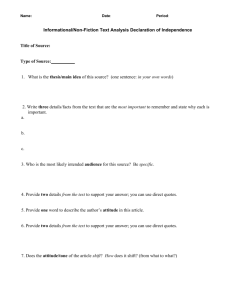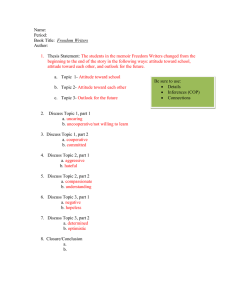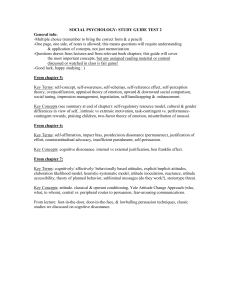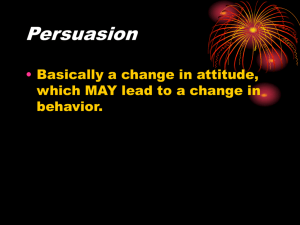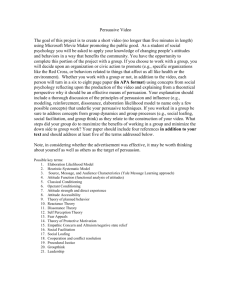Thesis Statements
advertisement
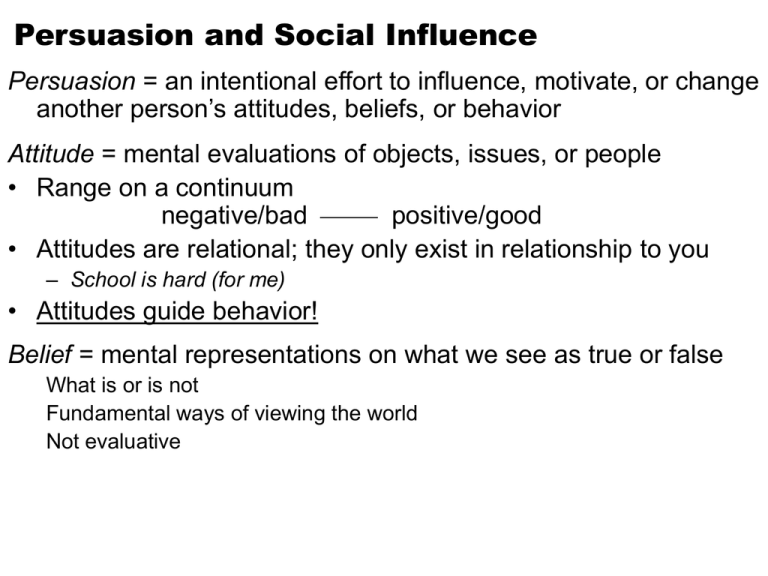
Persuasion and Social Influence Persuasion = an intentional effort to influence, motivate, or change another person’s attitudes, beliefs, or behavior Attitude = mental evaluations of objects, issues, or people • Range on a continuum negative/bad positive/good • Attitudes are relational; they only exist in relationship to you – School is hard (for me) • Attitudes guide behavior! Belief = mental representations on what we see as true or false What is or is not Fundamental ways of viewing the world Not evaluative Types of Persuasion Compliance = behavior change without attitude change – Thesis: You must write your congress person to get them to pass the waiting period legislation for ammunition purchases. Adoption = taking on a new attitude/behavior – Thesis: The ten day waiting period on ammunition purchases needs to be implemented. Continuance = encourging/strengthening an existing attitude/behavior – Thesis: We must continue to support the bullet bill to reduce the impact of firearms on our society. Cessation = stopping an existing attitude/behavior – Thesis: The newly proposed bullet bill does not infringe on our rights. Inoculation = preventing new attitude/behavior from developing – Thesis: Rather than infringe on our rights, the proposed bullet bill will help guarantee all Americans the ability to feel safe. Appeals Appeal = interpretations of evidence that provide listeners with a reason to change their attitudes, beliefs, or behaviors There are four types of appeals • Logos = factual and impersonal evidence that appeals to logic – The average child watches four hours of television a day. • Pathos = emotional or personal evidence that appeals to the heart – Little Johnny is suffering socially and academically because of tv. • Ethos = evidence that demonstrates credibility – My four years of graduate work in mass communication lead me to believe that extensive television viewing is dangerous • Mythos = value and core belief evidence that appeals to people’s belief in the greater good; Law of Transitivity – Our children’s rights to life, liberty and the pursuit of happiness are being drained aways by their television watching habits. Powerful Compliance Principles To Use and Be Aware Of • Reciprocity – One should be more willing to comply with a request from someone who has previously provided a favor -Pre-giving -Door-in-the-face • Social validation – One should be more willing to comply if the request is consistent with what similar others are doing -Highlighting or modeling desired behaviors • Commitment/consistency – After committing to a position, one should comply more with consistent requests -Foot-in-the-door -Bait and switch • Friendship/liking – One should be more willing to comply with the requests of someone who is liked – Word-of-mouth marketing • Scarcity – One should try to secure things that are limited/dwindling – Going out of business sales • Authority – One should comply more with legitimate authority Ways of Persuading Persuasion falls into two types: • Promotive = attempts to make the action/idea attractive and positive • Preemptive = attempts to decrease the negative features of the action/idea Tactics for persuading (based on classical Rhetoric) Landscaping = the context in which the persuasion takes place – Setting the issue up in a way to make it appear more favorable – Framing the debate via language (e.g., the “estate tax” a “death tax”) Relational tactics = how people view the persuader and roles – Credibility of the speaker – Dress for success Message tactics = helping the target of influence to create his/her own arguments/reasons for the desired action/idea – Central vs Peripheral processing – Quantity of arguments when peripheral and quality when central Emotional tactics = playing on the targets emotional needs and desires – Using the target’s feelings and arousal to achieve the desired action/idea – Scaring someone to act
